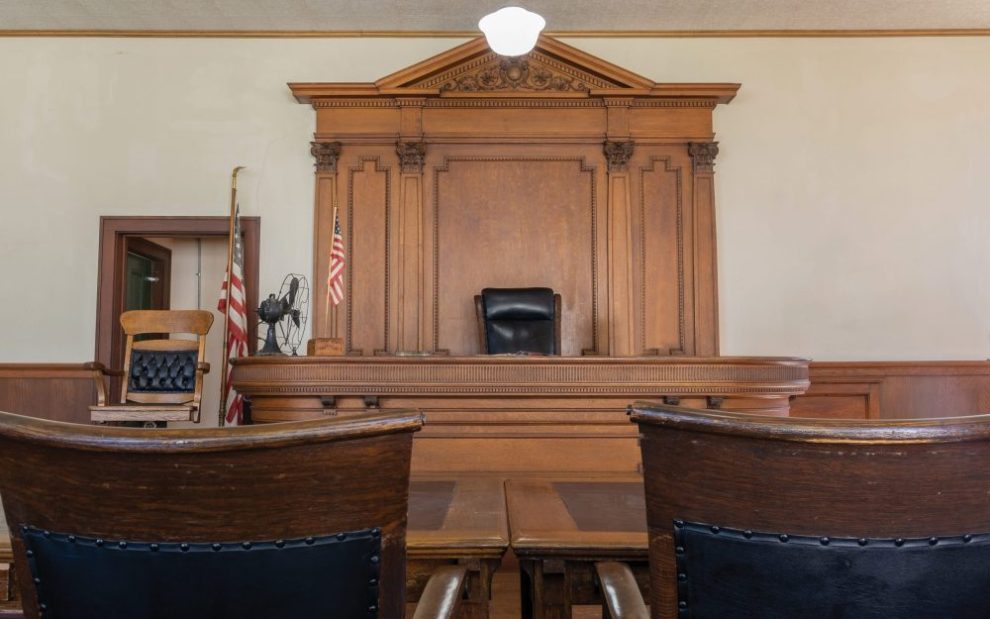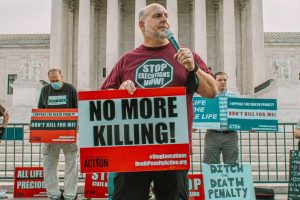In recent presidential election cycles, “law and order” has dominated U.S. political imagination about criminal justice. When most Americans hear the phrase, they likely think about the TV series Law & Order, which explains policing and prosecution, two components of the U.S. criminal justice system, by combining Sherlock Holmes-like detective stories and Perry Mason-like trial narratives. Law & Order viewers rarely learn, however, about two other elements of the U.S. criminal justice system: judicial sentencing and the correctional system.
Complex social issues demand complex solutions, yet our current bipartisan presidential politics often oversimplifies these challenges, reducing them to a single issue: “law and order.” This reductive approach frequently leads to criminalization as a one-size-fits-all solution. To transcend the narrow narrative of law-and-order politics, Catholic voters must hear more diverse stories, particularly those that examine the intricate connections between sentencing, corrections, and drug-related offenses, which account for a significant portion of U.S. crimes.
Law-and-order politics captured both major U.S. presidential political parties for decades. Both Democrats and Republicans embraced tough-on-crime policies, as exemplified by President Lyndon B. Johnson’s “War on Crime” and New York Governor Nelson Rockefeller’s harsh drug laws, which contributed to rising prison populations. The crack cocaine epidemic of the 1980s and subsequent legislation under Presidents Ronald Reagan and Bill Clinton increased penalties, expanded the prison system, and introduced mandatory sentencing guidelines that have fueled mass incarceration.
Recent Supreme Court opinions illustrate the struggle to move beyond this master narrative. After decades of debate over criminal justice reform, President Donald Trump and Congress passed the First Step Act of 2018, a bipartisan effort to begin reversing the impact of federal sentencing laws and improving conditions inside federal prisons. Federal sentencing guidelines are either mandatory or individualized. Individualized guidelines ask judges to follow a structured system of offense levels and to adjust their sentencing based on specific offense characteristics (e.g., the use of a firearm) and general offense characteristics (e.g., the obstruction of justice), as well as the offender’s criminal history.
Before the First Step Act, anyone with a criminal history, even a single 60-day prison term or two minor offenses without a prison sentence, couldn’t qualify for individualized sentencing. The First Step Act removed this strict criterion, creating another list of criteria—such as not using a dangerous weapon or withholding evidence—that, if met, would make the convicted person eligible for individualized sentencing. Mark Pulsifer, who pleaded guilty to distributing methamphetamine, argued for individualized sentencing under the Act, claiming that since he had met most of the criteria of the statute, he was eligible. However, the bipartisan Court’s majority disagreed.
Writing for the bipartisan dissent, Justice Neil Gorsuch said the majority read words into and out of the statute by interpreting and as or in the list of requirements. Gorsuch continued, “If this difference seems a small one, it is anything but. Adopting the government’s preferred interpretation guarantees that thousands more people in the federal criminal justice system will be denied a chance—just a chance—at an individualized sentence. For them, the First Step Act offers no hope.”
Gorsuch’s dissent reminds me of words in James Weldon Johnson’s hymn, “Lift Every Voice and Sing.” In Black churches across the nation, Christians sing:
Stony the road we trod, / Bitter the chastening rod, / Felt in the days when hope unborn had died; / Yet, with a steady beat, / Have not our weary feet / Come to the place / For which our [people] sighed?
Catholic voters must recall the old stories, recasting themselves as hopeful and courageous builders of new social bonds. To inspire such hope in the upcoming presidential election season, the U.S. bishops added and approved a new “Introductory Note” to their 2015 document Forming Consciences for Faithful Citizenship at their November 2023 Plenary Assembly. Pope Francis’ 2020 encyclical Fratelli Tutti (On Fraternity and Social Friendship) highlights the parable of the Good Samaritan. Pope Francis and the U.S. bishops urge Christians to rediscover their role in fostering new social bonds and to persist in creating a compassionate society that seeks the common good.
Catholic social teaching provides enduring principles for Catholic voters, emphasizing human dignity, the common good, solidarity, and subsidiarity. Human dignity grounds all Catholic social actions, including voting. The first creation story in Genesis teaches how an orderly God created all human beings in God’s image or the imago Dei (Genesis 1:27). God’s glory shines on every person’s face in the same way it shone on Moses’ face when he came down from Mount Sinai with the Ten Commandments (Exodus 34:29). Everyone, including those who violate laws, has equal human dignity. While death-dealing oppression and sin-sickness might deface, discolor, and dim human dignity, they can never destroy the imago Dei. Human dignity does not arise from dignified social realities; it springs from God’s grace.
Catholic voters should also remember the corporeal and spiritual acts of mercy. Mercy draws us deeper into a community with those who violate laws. The spiritual acts of mercy—counseling the doubtful, teaching the ignorant, correcting sinners, comforting the sorrowful, forgiving offenders, patiently enduring wrongs, and praying for the living and the dead—should inform the corporeal acts of mercy, such as caring for the hungry, thirsty, homeless, sick, imprisoned, dead, and poor.
For Thomas Aquinas, all human laws, including criminal laws, were an ordinatio (or ordering) of reason for the common good. While he saw civil peace as a common good, Aquinas did not believe criminal law should or could address all moral vices. While correction is necessary, imprisoned offenders also deserve education, counseling, consolation, patience, forgiveness, and prayers.
Our current narrative of law-and-order politics contravenes these essential Catholic values. As Catholic voters, we are called to uphold these teachings, not law and order politics, ensuring that our actions and decisions reflect the full dignity and mercy that God extends to every person.
This article also appears in the November 2024 issue of U.S. Catholic (Vol. 89, No. 11, pages 40-41). Click here to subscribe to the magazine.
Image: Shutterstock














Add comment